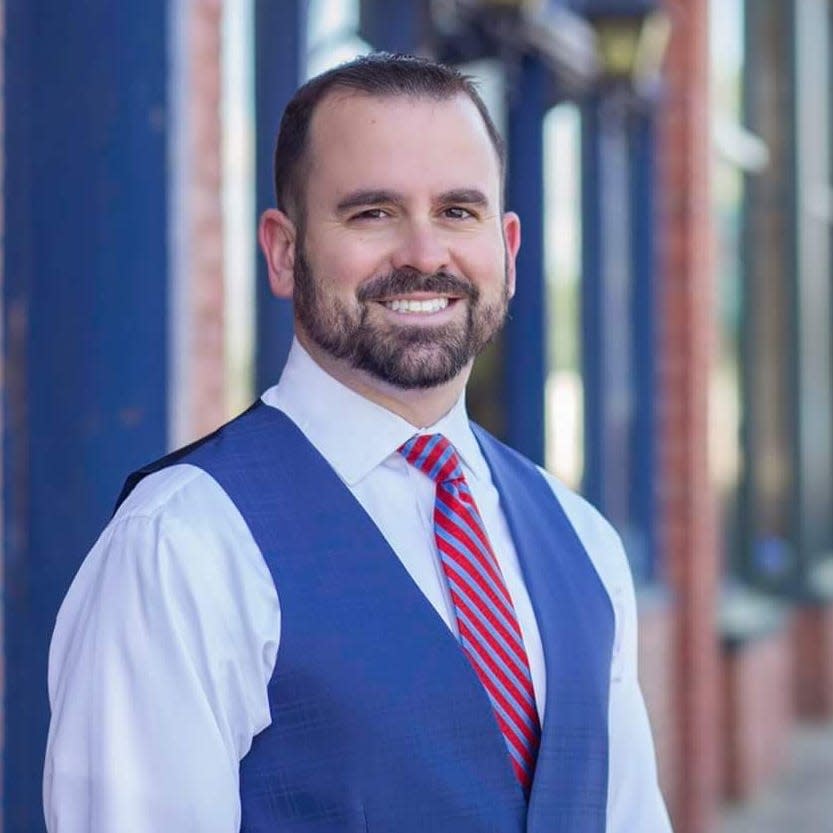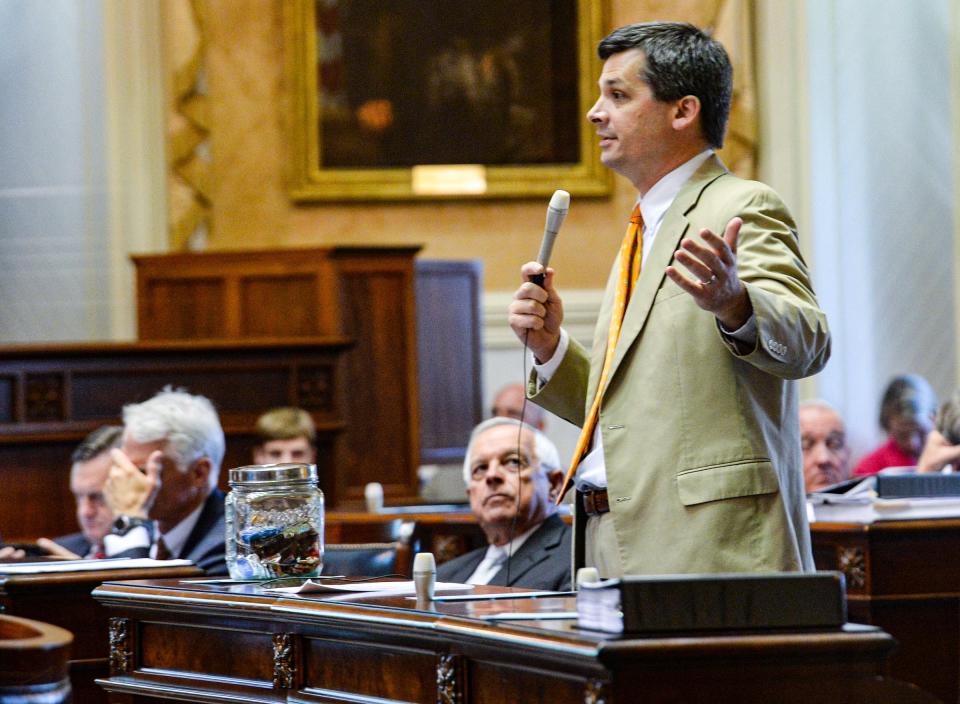This week in South Carolina politics: Here's what to know as legislative session nears end
South Carolina lawmakers have less than a week left on the legislative calendar to move the needle forward on bills.
Last week, Senate lawmakers voted on key legislation that offered paid family leave to teachers and school district employees. They also discussed the importance of home rule and local regulation of nicotine products.
But tensions rose during debate about the critical race theory bill, raising questions about who sets the agenda and what matters the most when residents step out to vote during elections.
Let's dive into what happened and what to expect before the session ends Thursday.
Here’s what to know: South Carolina passes shield law in effort to resume executions.
A tale of two brothers: How a Spartanburg lawmaker and his brother finally met a bear
South Carolina teachers and school district employees on track to get paid family leave
Last week, Senate lawmakers passed H. 3908, which would guarantee six weeks paid leave for public school teachers following the birth or adoption of a child or the placement of a foster child.
The bill, introduced in the house by Upstate lawmaker Rep. Neal Collins, R-Pickens, passed 38-0 in the Senate.
Sen. Sean Bennett, R-Dorchester, said the bill matched benefits that were extended to state employees last year. In the case of two parents, both parents can take the paid leave consecutively and concurrently, Bennett explained.
SC school vouchers: Opponents say bill lacks 'evidence' for success, won't level playing field

The Senate made an amendment in the language where the rules surrounding paid leave would be handled by the Board of Education and not the Department of Education.
The bill now heads to the House, where lawmakers will vote on the amendments.
Senate advances bill barring local governments from enacting restrictions on tobacco products
Supporters of the tobacco industry-backed H. 3681 said it would prevent a "patchwork quilt" of rules in the state and would instead ensure a uniform law for all.
Sen. Danny Verdin, R-Laurens, said the bill pre-empted a problem that currently does not exist but having uniformity made "good business sense, good regulatory sense and makes good heath policy sense."
He said local governments cannot pinpoint and ban a particular product or tobacco flavor if they felt it was harmful.
So far, Myrtle Beach, in 2018, is the only local municipality that passed an ordinance to restrict flavored e-cigarettes.
Sen. Thomas McElveen, D-Sumter, who has opposed the bill for years, questioned why it was such a problem if a local government wanted to ban flavors such as cotton candy or menthol to deter minors from smoking.
"This is just a small carve out affecting tobacco products, am I wrong about that?" McElveen said, adding that this bill may take tools out of a local body's hands.
Earlier this year, when the Senate Medical Affairs Committee was debating a similar Senate bill, public health advocates were staunchly against the move. Beth Johnson with the American Cancer Society Cancer Action Network told the Greenville News on Feb. 8, 2023, that lawmakers could instead prioritize matching state law with federal law.
Federal law bans the sale of tobacco products to youth under the age of 21 and takes precedence over state law, which allows the sale of tobacco to youth under the age of 18.
Echoing McElveen, Johnson questioned whether this bill protects minors from tobacco products. Or, will it prevent local governments from doing what the state has not been able to do?
The future of the SC Republican party: Freedom Caucus wants to change policymaking. GOP Caucus concerned by tactics, direction.
State Senate: Republican state Rep. Roger Nutt at peace with decision to run

Sen. Brad Hutto, D-Orangeburg introduced an amendment to penalize businesses that sold products to minors in an attempt to shift the focus of the bill from ensuring uniformity to curbing minors from accessing products. The bill gives local police and SLED jurisdiction to enter stores to enforce age-appropriate restrictions.
The bill passed 26-16.
Lawmakers feud over critical race theory and hate crime legislation
When the House sent over H. 3728, Senators took out provisions that would allow any person to sue the school district and also mandate teachers to post their curriculum three days before they were going to teach it in class.
Senate Majority Leader Shane Massey, R-Edgefield took the well to explain the bill. He reiterated he wanted children to learn about uncomfortable events of the past and that they should not be blamed for the events. The bill will set up a complaint form for parents and guardians to contest instructional materials they think are inappropriate.

"There has not been one complaint or one record of a teacher blaming an individual student for anything that has happened in history," Sen. Darrell Jackson, D-Richland. "It concerns me because this sounds like Fox News talking points."
Democrats said they feared the complaint forms will lead to prohibitions and inevitably impact the professional development of teachers.
"We want our teachers to be creative!" Sen. Vernon Stephens, D-Orangeburg said.
The discussion grew testy after Democrats posed questions about why lawmakers refused to debate the hate crimes bill. They argued that while there weren't records of teachers asking elementary school students to feel guilty about their race, there were instances of hate crimes.
Dig deeper: Could the lack of a hate crimes bill hurt job growth in South Carolina?
South Carolina and Wyoming are the two only states without hate crime legislation. The current hate crime legislation was passed from the House with a thumping majority but is blocked in the Senate. Last year, a similar blockade in the Senate ultimately killed the bill.
Massey said the critical race theory bill had a better chance of countering hate and referred to the current hate crime legislation as a solution that was just "for show".
He said if the people in South Carolina wanted a hate crimes law passed, there would be enough people in the Senate who will move to make that happen.
"Respectfully, If we have folks on the left who don't like the agenda that's being set, go out and win a frikking election," Massey responded.
The bill is still waiting for a vote.
Abortion issue in presidential race: Nikki Haley wants to be 'consensus builder' in heated national debate
Advocates anticipate another go at an abortion ban
Senators blocked a near-total abortion ban on April 27, 2023. But now, their six-week abortion ban sits in the House. With three business days left, advocates anticipate the House will debate the six-week abortion ban.
The six-week abortion ban is similar to the 2021 fetal heartbeat bill that was struck down by the SC Supreme Court. Senate lawmakers said they introduced provisions to safeguard the bill from future litigation.
For that to pass, far-right lawmakers would have to budge from their position of passing an abortion ban from the time of conception and end a deadlock that has continued since last year.
Devyani Chhetri covers South Carolina politics for the Greenville News. Reach her at dchhetri@gannett.com or @ChhetriDevyani
This article originally appeared on Greenville News: SC lawmakers to discuss CRT, abortion ban, hate crimes, tobacco

